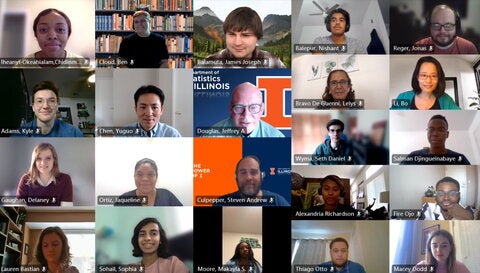
The first annual Blackwell Summer Scholars Program finished on July 2, 2021, with the Blackwell Scholars student presentation event. The program witnessed fourteen scholars embark on a six-week-long journey as they worked together on an assortment of projects, culminating with their research presentations at the end of the program. The Blackwell Summer Scholars Program kicked off on May 24, 2021, with a Welcome Event hosted by the Departments of Statistics and Mathematics with opening remarks by Associate Chair, Professor Jeff Douglas (Statistics), Associate Dean, Matt Ando (College of LAS), and Department Chair, Professor Bo Li (Statistics). Named for University of Illinois Mathematics alumnus, David H. Blackwell, the Blackwell Summer Scholars program intends to honor the legacy of the world-renowned scholar of mathematics and statistics. Created to increase the access and equity for graduate degrees in statistics, data sciences, and mathematics, the Blackwell Summer Scholars program invited fourteen scholars to carry on his legacy during this summer workshop series.
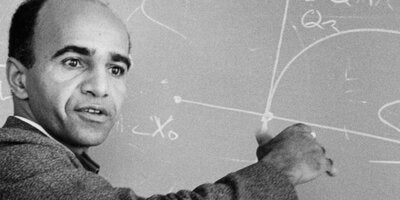
Originally intended to be an in-person program that would see the scholars invited to campus to work together, mingle, and participate in social activities, however, due to the ongoing COVID-19 pandemic the organizers restructured the program as a remote online program. The scholars would meet with their mentors and research partners via Microsoft Teams and work together from their home locations to overcome the obstacles of not being able to meet in person to work on their projects together. With access to message boards, conference video chats, and a research and instructional staff, the fourteen participants were able to overcome any technical hurdles by completing their goal of presenting their research at the end of the program.
While their research projects were the primary focus, the scholars also attended fifteen scheduled seminar presentations throughout the program. These talks included topics such as GitHub and R-Markdown presentations, Python in data science programming, data visualizations, what it means to prove a theorem and what happens next, as well as career talks, and topics about graduate degree programs options. Current Statistics-PhD students even took some time to host a Ph.D. Roundtable discussion with the undergraduate scholars to talk to them about graduate degree programs and advanced research from a student’s perspective.
Selected from a highly competitive applicant pool, the Blackwell Scholars received invitations in March to participate in the inaugural event. The student scholars were then paired up with mentors from the University of Illinois Departments of Statistics and Mathematics based on their research interests. The mentors included Professor Bo Li (Statistics), Professor Jeff Douglas (Statistics), Associate Professor Steve Culpepper (Statistics), Professor Yuguo Chen (Statistics), Assistant Professor Sabyasachi Chatterjee (Statistics), Visiting Associate Professor Lelys Bravo (Statistics), and Professor Richard Sowers (Mathematics). Paired with their mentors and with assistance from the Research and Instructional Staff of James Balamuta, Jonas Regar, and Seth Wyma, the fourteen scholars began working on their research projects immediately.
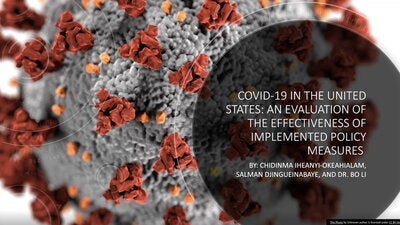
Chidinma Iheanyi-Okeahialam of the University of Florida (Public Health) and Salman Djingueinabaye of the University of Nebraska (Computer Science) were paired with Bo Li for their project. The scholars gave a presentation titled “COVID-19 in the United States: An Evaluation of the Effectiveness of Implemented Policy Measures”. The scholars used their project to look at the delay in public policy measures implemented during the initial COVID-19 outbreak and evaluate the effectiveness of preventative measures in limiting the spread of COVID-19 in the United States.
MaKayla Moore of Winston-Salem State University (Mathematics and Statistics) and Laney Gaughan of Grinnell College (Mathematics) were mentored by Jeff Douglas for their project. Their presentation, titled: “Diabetes in American Pima: Risk Factors and Prediction”, looked at the effect of diabetes in the American Pima communities. The scholars needed to take their incomplete data sets and proceed to use regression imputation to clean the data to help estimate the missing predictors.
Macey Dodd of Colorado State University (Economics and Statistics) and Thiago Otto of Columbia University (Mathematics-Statistics and Psychology) were paired with Lelys Bravo. “Analyzing Tornado Occurrence as a Function of Environmental Covariates”, was the topic of the scholars' presentation. Their research looked at analyzing point patterns and the environmental covariates to predict the likelihood of tornado impacts in the United States. The scholars used Complete Spatial Randomness and Poisson Processes to help analyze their predictive data.
Nishant Balepur (Computer Science & Statistics) and Ben Cloud (Mathematics & Statistics), both of the University of Illinois Urbana-Champaign, were paired with Richard Sowers for their project, “Hospital Patient Fall Dynamics.” The pair looked at the frequent tendency for elderly hospital patients to suffer falls out of their hospital beds in an attempt to understand these falls before they happen. Using data anonymously collected by Ocuvera and organized into a database containing hours of footage, the researchers looked at how they can identify fall indicators to help predict and prevent future patient falls. The scholars were able to organize all of their code into Jupyter Notebooks and ran them through the Hardware-Accelerated Learning (HAL) cluster at the Innovative Systems Lab at UIUC. Though the summer research program is over, both scholars have decided to continue working with their datasets and continue their research independently of the program.
Kyle Adams of the University of Florida (Mathematics & Statistics) and Sophia Sohail of the University of Illinois Urbana-Champaign (Mathematics & Economics) were paired with Sabyasachi Chatterjee. The scholars’ presentation, “Distributional Regression by Dyadic CART”, looked at creating a regression model to predict the conditional CDFs of various distributions. While working on this project, the pair learned about the nonparametric curve fitting method while also implementing Cross-Validation for Dyadic CART. They also tested their model on both simulated data and real datasets to determine its accuracy.
Firekunmi Ojo of the University of Maryland Baltimore County (Mathematics and Philosophy) and Alexandria Richardson of the University of California, Riverside (Statistics) were mentored by Steve Culpepper for their project. The presentation titled “K-means Clustering of Fraction-Subtraction Data”, which looked at using the clustering algorithm to identify groups of common individuals and how they answered the fraction-subtraction problems. The goal of the project was to find better ways to make assumptions about data and apply them to find better ways to assist a group or cluster.
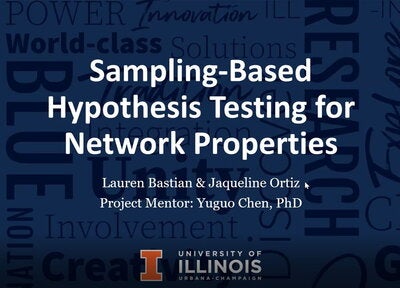
Lauren Bastian of the University of Minnesota, Twin Cities (Statistics) and Jaqueline Ortiz of the University of Illinois Urbana-Champaign (Mathematics and Statistics) had their project guided by Yuguo Chen in their network data project. Lauren and Jaqueline’s presentation was titled “Sampling-Based Hypothesis Testing for Network Properties.” The pair worked to understand the properties of clustering networks to learn about the interactions and relationships between various subjects. Specifically, the research group looked at the social network of dolphins to map out the attack tolerance of a pod of dolphins when highly connected subjects are removed from the cluster. Their research could be applied to study various ecosystems that rely on connected dynamics to function and review what happens when key components are removed from the network.
“There were some very impressive talks, there was a lot of variety, and it really exceeded my expectations,” Jeff Douglas said during the closing remarks for the program. “This just reflects that we picked a great group of students. We knew they could do academic work, but I was impressed by how everyone was able to present so well. One of the goals of this summer was to take students that were showing some interest in statistics, math [and] data science, to help you see some directions you can go to help you set up your futures,” Douglas continued during his remarks.
In the spirit of David H. Blackwell’s love and curiosity about mathematics and statistics, the student participants in the Blackwell Summer Scholars program took this opportunity to be exposed to various research methods and theoretical topics. As most of the participants are rising juniors and seniors, most had not been exposed to true research methods outside of the classroom. A goal of the program was to provide valuable insight to young scholars as they begin to think about future academic and professional goals. As STEM fields struggle to diversify their most valuable asset of working analysts, researchers, scientists, and educators, the Blackwell Summer Scholars program hopes to broaden the exposure of these opportunities to young scholars as they continue on their journey to the future.
With the first annual Blackwell Summer Scholars program wrapped up, the organizing committee also looks to the future as they plan next year’s event.
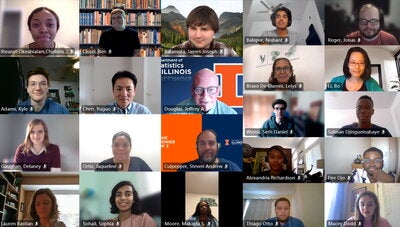
Click Here for more information on the Blackwell Summer Scholars Program
Aaron Thompson, Statistics
2021-07-23